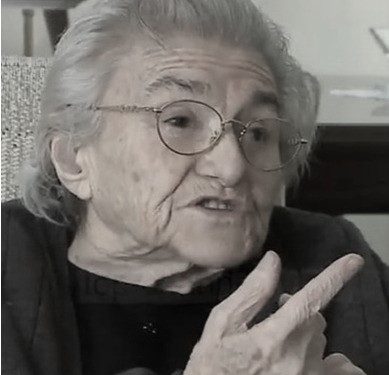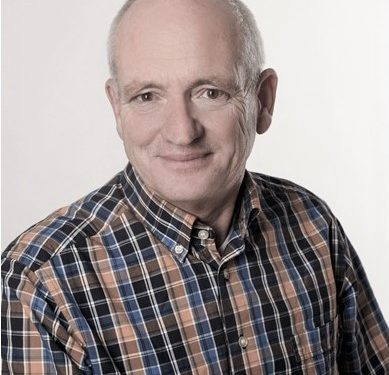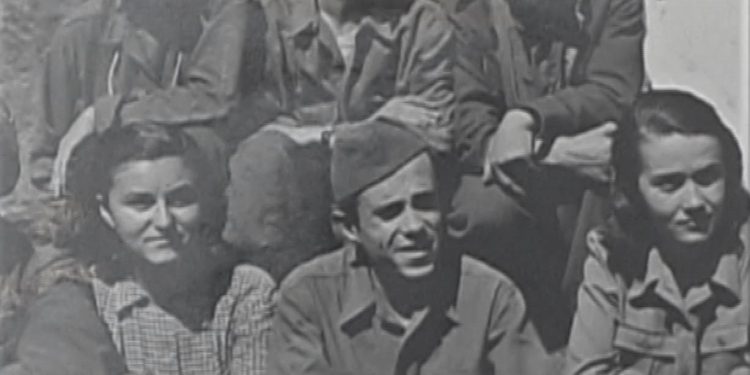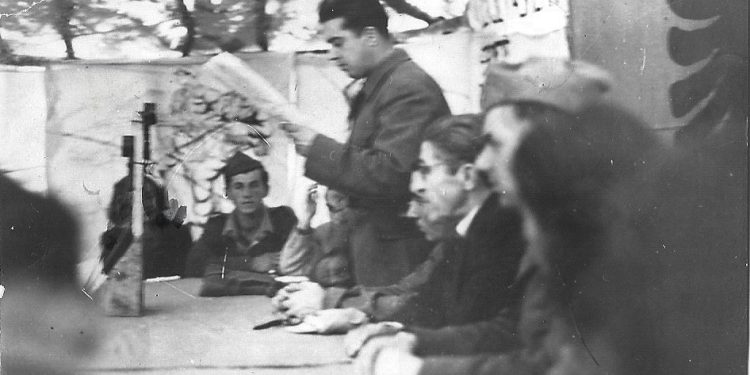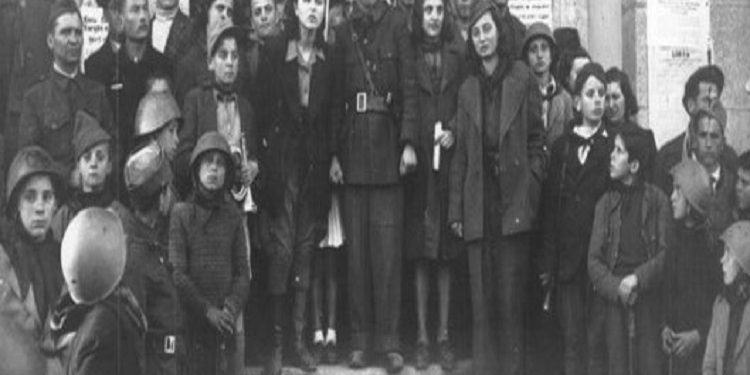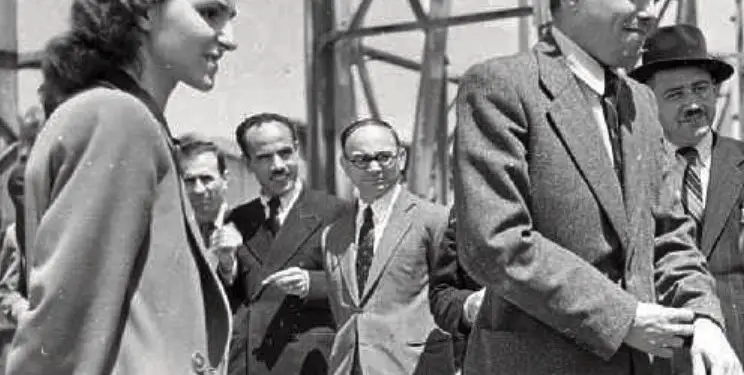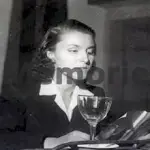By Robert Elsie
The first part
Narrative of life / Liri Belishova, in an interview with the well-known British researcher and albanologist, Robert Elsie: “Why did I become a communist and the crimes of Enver”
Memorie.al / In November 1945, he participated in a world youth congress held in London. In ’46-’47, she was the president of the People’s Youth. When in 1947, her first husband, Nako Spiru, was purged from the party and committed suicide, Lirina was removed from political positions and sent to Berat as a teacher. The reason was her support for Albania’s economic independence from Yugoslavia at the time of the brief alliance between the two countries. Liri Belishova was a very popular personality in the first years of communism in Albania. She was born in 1923, in the village of Belishovë in Mallakastra, from a rich family. In the late 1930s, she attended the “Queen Mother” Institute in Tirana, where she studied for a while as a nurse. Inspired by the novel “Mother” by the writer Maxim Gorky, Liria joined the communist resistance movement during World War II, where she also lost an eye during the fighting. In 1944, Liria was the secretary of the Anti-Fascist Youth Council and at the end of the war she was a member of the Democratic Front.
In November 1945, he participated in a world youth congress held in London. In the period 1946-1947, she was the president of the People’s Youth. When in 1947, her first husband Nako Spiru (1918-1947) was purged from the party and committed suicide, Lirina was removed from all political positions and sent to Berat as a teacher. The reason was her support for the economic independence of Albania from Yugoslavia, at the time of the brief alliance between the two countries.
In 1949, after the fall of Koçi Xoxes (1917-1949), Liria was rehabilitated and from 1948 to 1960, she was a member of the Political Bureau. Together with Ramiz Ali (1925-2011), she attended the Marxist-Leninist Institute in Moscow in the years 1952-1954 and in the period 1954-1960, she was the Secretary of the Central Committee of the Party, for Propaganda. During these years, she was married to Maqo Chomon, Minister of Agriculture in 1954-1960.
On her way back from an official visit to China with Haxhi Lleshi (1913-1998) and Gogo Nush (1913-1970) in June 1960, Liri Belishova stopped in Moscow and allegedly spoke with Soviet leaders about anti-Soviet intentions of Chinese leaders. On September 8 of that year, Albania severed political relations with the Soviet Union.
During the purges that took place as a result of the change in political course, Liri Belishova was removed from all political and party positions as a sympathizer of Khrushchev. After a while, he was arrested and sent to Gjirokastra prison. After that, he was exiled for years in Cërrik of Elbasan. Indeed, Liri Belishova was released in 1991, after spending 31 years of her life in exile.
In this interview conducted in Tirana in July 2011, Liri Belishova talks about her early interest in the communist movement as well as her disappointment and disdain for the future fate of this movement in Albania after the Second World War. Also, she expresses her opinions about many public personalities she met over the years, including Enver Hoxha, Mehmet Shehu, Nako Spiru, Musine Kokalari and Ramiz Ali.
Ms. Belishova: Why did I become a communist?
I was 11 years old, when a cousin of mine who was studying at the “Normal” School in Elbasan, to become a teacher, told me about socialist ideas, that this society is unfair and that there was not much material, that there was a lot of poverty in Albania and in the province where we lived, in Mallakastër, and that we must fight for a society that is just, for people to live well and so on, and he gave me to read the book “Mother”, by Maxim Gorki.
I had just finished the fifth grade, primary school. I was 11 years old, not even a teenager. It was July 1937, and I would turn 11 in October, on October 14. However, I read this book with great emotion. Of course, I did not understand all of them or I understood them in a very simplified way and I agreed with this cousin of mine that capitalism must be overthrown and this new, enlightened society should be built. They were the dreams of a child.
But these had their importance because, at school, there were girls who were connected to communist groups, who were older than me. And they, without talking to me directly, fed me this thought, at least on the critical side, that this society is unfair, there are many wounds. In addition, reading fiction, i.e., the great critical writers of the West, I can say, played a big role for the development of the Communist Movement of Albania, because they criticized the problems, the negative sides of the capitalist society and we thought here, these “enlightened heads”.
Now, in these thoughts, as it were, of a romantic teenager, the occupation of Albania by Italy was added. We were much attached to patriotic ideas because our parents and school taught us this. The teachers were very patriotic. And we felt a lot of hatred not only for the five-century Ottoman occupation, but also for the dismemberment of Albania, which we called a great injustice (the decisions of the London Conference of 1913 that left Kosovo, Chameria and many Albanian lands under Yugoslavia and under Greece). These feelings were very strong. And these were connected with communist ideas, this patriotism, because we thought that only a communist party will be able to organize the war and save Albania.
And so, in 1941, the Communist Party was created, and a few days later, on November 23, the Communist Youth. I and many of my friends joined this organization, thus conceiving socialism, i.e., a beautiful dream. And during the war, we started to read something, literature, that is, it was very small things, but even what we read, I remember a booklet “Economic development of human society” and some works of Stalin, we perceived all this in a very superficial way because we were very young.
But the Albanian Communist Party was born as a Stalinist party, not like the other parties of the Balkans and Europe, which have a social-democratic past, have had a trade union movement, even a liberal party. We were born as a Stalinist party and our upbringing was Stalinism. It was called Leninism, but not really.
But Marx and Engels were very little known and even more so it was said that we will get the ideas of Marx and Engels through Stalin because Stalin adapted these ideas to the new times. Then, everything the Party did seemed right to us, and the discipline was such, the education was such that the cult of the Party Central Committee and the Party itself was created, that what the Party says is not discussed, it is right, must be implemented.
So we were not able to understand the mistakes made by the Communist Party during the War. They definitely made an impression on us, but for myself, not only at that time but also many years later, I suffered spiritually because I thought that, being a girl who comes from a more or less poor family, I have micro-bourgeois waste, which is not I am a good communist. And so to speak, it was a self-rebuke, a self-punishment of myself. I did not give justice to the natural thoughts and feelings of a man who has some humane feelings, some democratic feelings, I think for every normal person.
However, at the end of November 1944, the Second Plenum of Berat took place. And I was not there, although this plenum chose me as a candidate, I was in Tirana then, I was not in Berat, he severely criticized Enver Hoxha, for his sectarianism, and together with Enver Hoxha, Miladini was also criticized because, Enver Hoxha says in this plenum and this is how the reality was, that; Miladini was his teacher and he did everything Miladini said. And these criticisms that were in the first place for a great sectarianism, those that Sejfulla Malëshova said: “If we do not give up this path, we will end up in a terrorist party”.
There are many facts. There, one of the members of the Central Committee who later became a Bureau member, Gogo Nushi, said that; being the first Secretary of Tirana, he had received from Enver Hoxha a letter with a list, where there were thirty or so people, with the order to be shot, but to be shot secretly so that it would not be known in public that they were killed the communists.
Gogo Nushi said: “I was surprised that all the people who were on this list were not fascists or collaborators of the fascists, of the Germans, but anti-fascist patriots connected to us, or even communists.”
Enver Hoxha intervened and told him: “You yourself wrote to us and criticized these people”. Gogo Nushi replied: “Comrade Enver, I wrote to you that these people have some unclear things, some dissatisfaction, in order for us to clarify them, to convince them, but not to shoot them.” And Enver Hoxha did not oppose it.
Although I thought that someone could not be punished so severely because there were no crimes, it was only a political issue, but to be honest, I was shocked when I was in the Netherlands and they told me that there, as war criminals, they shot only four people, a small part they imprisoned, deportations could not be done because, the Netherlands is very urbanized, and the rest they made a public punishment, that is, they were criticized in the newspapers and they themselves asked for forgiveness.
There were laws that prevented them from taking state positions, etc. And yet, they seemed right to me then, but, as I said, I had these reservations.
The next stage was when the extraordinary taxes of the War were made and such taxes were set that not only economically ruined the various merchants, factory owners, etc., but actually left them without bread. A part of them tried to preserve this wealth, p. e.g., the gold they had, etc., and they were treated cruelly. They tortured them, shot them, and took their children and women out of their homes, sent them to live in barracks, huts. These, to be honest, did not look good to me. But, I thought, they are class enemies.
Comrade Stalin always dominated the brain and that human spirit which, every man has, was at war with Stalinism. A bomb was thrown at the Soviet embassy and on that occasion, as a response, 22 people were shot, who had nothing to do with this action, I can say, with this incident.
However, they were shot as revenge and to scare others, according to Lenin’s slogan: “We will respond to white terror with red terror”. This did not make a good impression on me, but I didn’t talk about talking. And I want to tell you that Enver Hoxha himself, then told us that; Voroshilov, in the presence of Stalin, i.e., with his knowledge or on his order, said to Enver Hoxha: “What are you doing like this, Enver, why are there 1 million Albanians?”
“Yes, they threw a bomb, Comrade Voroshilov”, Enveri said. “No matter how many bombs are thrown at our consulates and embassies, a window was broken, no one was killed. 22 people are shot for this”?! Guess now. We know who Stalin and Voroshilov were, and they have removed the warning from Enver, for excessive repressive measures.
Then came the work of the kulaks. At that time, my second husband, Maqo Çomo, was first the Deputy Minister of Agriculture, and then he became the Minister of Agriculture. And he especially had contact with the village and told me cases that were really painful and absurd. That is, in one village they announced 20 kulaks, 30 kulaks.
Personal enmity, do you understand all this? For example, a woman was declared a kulak because she had a beautiful daughter, no grown-up husband or son, to protect her. The village Party Secretary wanted this beautiful girl for his grandson. This did not give him that the girl did not want and because of this, they declared her a kulak. I.e. there were very bad things.
Now these made me think how many diseases this Communist Party has that I called ideal. But I also wobbled. Are these instructions right for the kulaks because, after all, the rich peasant became the one who was good, not the one who was lost?
And considering my village, for example, I knew that the poor villagers would take it in hand, but the poor villagers were the ones who were eaten by the louse and the flea, when they say, they were not the masters. However, as I said, there was always that doubt, but over time these things decanted, when they say, a drop today, a drop tomorrow.
Collectivization. Stalin ordered Enver: “Don’t rush collectivization, because you are a small, mountainous country, you don’t have industry to help the village. Go gradually. Don’t copy us, because we were forced to collectivize as a measure to protect ourselves from the Second World War. You don’t have this risk”. Enver Hoxha was a dictator, a bloody dictator because so many people were killed in this small nation. He also killed his closest friends.
I think, I mean, I don’t think but I can’t conceive of the three trials that took place in the 70s: the trial that took place against the soldiers who fell like an iron broom (he used this word himself) in the army ; the trial that took place against the economists, Koço Theodhosi, Abdyl Këllezi was shot, all those others were imprisoned, some died in prisons, some died in torture, such as Ahmet Jegeni, for example, one of the best economists; and the trial, which was then held for these people of culture and art, Todi Lubonja, Fadil Paçrami and who knows how many others. I don’t understand how a man could do this.
But I think that he was also very demagogic because, by nature, he was a handsome man, he was a man with cultivated manners, so to speak, and behind this mask, and such a man was hidden. Perhaps this man was like that; his instincts were such that not every man can become a dictator, and even more so such a dictator, because dictators have also existed in other countries of the East, but not like this.
But maybe it was also the work that he gained Marxism from Miladini. Miladin came from the Yugoslav Communist Party. It was the most radical party, the other one that changed as a result of the break with Stalin and to please the Americans, otherwise they wouldn’t bring them dollars. That is, it was a forced evolution. Maybe this is also what influenced it.
At first, I did not meet this man, I did not know him. For the first time I met him when the Youth Congress was held in Helma, in July 1944, I said that the congress was held later, either the end of June or the beginning of July. There was only one house there, the rest were tents. When he left this house, Nako told me: “This is Enver Hoxha”.
And I was surprised that all the others were dressed like partisans, with a jacket from those of the English, with civilian pants, with sneakers. And this one was dressed in the clothes of an Italian officer, very elegant, with polished boots, with hair as if he had done it with brilliance, and it surprised me that the communist leader is like that? The revolutionary?
But what shocked me and that I still remember today, was that the first word, without telling me how you are, that I was coming from prison, that I had been released from Tirana prison, from a place where terror was at its peak, said to me: “How did you allow Zai Fundo, the enemy, to escape?” You had orders to kill Zai Fundo at all costs”. I.e. I was shocked at this from the beginning. “I was in prison, Comrade Enver”, – I told him, – “I don’t know this”.
“Too bad I don’t know”, – he told me, – “The District Committee of Tirana, which is responsible for Zai Fundo, has done great damage to the Party”. And I was a member of the District Committee of Tirana, responsible for youth. But the thing is, I was in prison. I got out of prison and immediately went here. There was no logic here, there was great confusion, i.e. and I don’t know why he did this to me, to tell me that; you stay silent, or was it a natural thing for him, that these were important, the killing of enemies.
However, I never thought it would end this badly. And I know what it’s like to be honest. I was very sorry when different friends were punished. But I thought that these comrades will have made serious mistakes and the Party knows, there are other data. Memorie.al
The next issue follows




